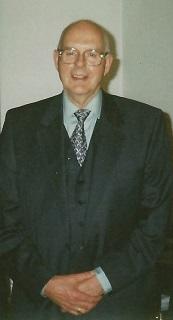Obituary on the death of Prof. Dr. Dr. h.c. Eckart Matthias
The Department of Physics mourns the loss of its former university professor, long-time colleague and friend Eckart Matthias, who passed away at age 90 on April 23, 2023, after a prolonged illness.
News from Apr 27, 2023
Eckart Matthias, who was born 1932 in Quedlinburg, left the GDR for the West shortly after high school, and studied physics at the University of Hamburg, graduating in Walter Jentschke's institute with a Diplom (Masters degree) in experimental physics. For his PhD, he transferred to the institute of Kai Siegbahn at Uppsala University, Sweden, where he made significant theoretical and experimental contributions to the then quite new method of γ-γ Perturbed Angular Correlations (PAC). In May 1963, he successfully defended his dissertation. In Uppsala, he also met his future wife Barbro; they married and – while they were still in Sweden – their first two children, Björn and Katharina were born.
At the invitation of the Miller Institute for Basic Research in Science at UC Berkeley, and endowed with the prestigious Miller Fellowship, he traveled with his young family to Berkeley/CA to conduct research in the group of Prof. David A. Shirley at the Lawrence Radiation Laboratory (LRL, now LBNL). After the 2-year Miller Fellowship, he remained at LRL as senior researcher and, with other colleagues, developed the new methods of nuclear magnetic resonance–PAC (NMR/PAC) and NMR on oriented nuclei (NMR/ON). In 1967, Shirley and Matthias organized the first international conference on Hyperfine Interactions in Asilomar/CA, a series of meetings that continues to this day.
After Eckart Matthias received the offer of a professorship at the Freie Universität Berlin in 1966, as successor to the founding professor of physics there, Hans Lassen, he spent the academic year 1967/68 at the new institute of Rudolf Mössbauer at the Technische Hochschule München (now Technische Universität München, TUM), where he obtained a Habilitation degree, at that time a prerequisite for a full professorship in Germany. This permited him to accept the offer as professor and director of the then 1st Institute of Physics at the Freie Universität Berlin. His family had already grown in Berkeley with the birth of daughter Karin, and it did so again in Berlin in 1970, when their youngest daughter Andrea was born.
His first years at the Freie Universität Berlin were difficult because the institute was practically orphaned after three years without a director, and the university as a whole was undergoing a period of changes due to student unrest and modernization efforts. Matthias, together with Stefan Hüfner, who was appointed already in 1968 as director of the new 4th Institute of Physics, and Karl-Heinz Bennemann, appointed in 1971 as director of the new Institute for Theory of Condensed Mater, succeeded in reorganizing the physics department and structuring it in accordance with the Berlin Higher Education Act of June 1970. That structure proved in the following years to be advantageous and sustainable, right up to the present time. The reorganization of the entire Freie Universität Berlin was completed in March 1972. In later years, Matthias served as Department Chairman for a total of 9 semesters, and he was instrumental in the establishment of several DFG Collaborative Research Centers (SFB’s), beginning with SFB-161 (Hyperfine Interactions, 1972-86).
From the mid-1970s, Eckart Matthias reoriented his field of research from hyperfine interactions to light-mater interactions in the broadest sense. This began with the use of synchrotron radiation, and soon expanded to applications of laser spectroscopy to studies of Rydberg atoms, multi-quantum transitions, laser-surface interactions, second harmonic generation (SHG) at surfaces, magnetism, ultrafast electron and spin dynamics, and thermal dynamics. Until his retirement in the year 2000, he led a very active research group that gained international recognition and trained numerous Masters and doctoral students. His work benefited the department as a whole, as well as the careers of a number of young scientists, in a very positive way. The members of the Physics Department are deeply indebted to him for his dedication, friendship, and readiness to help.
Keywords
- Eckart Matthias
- obituary
